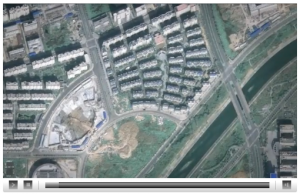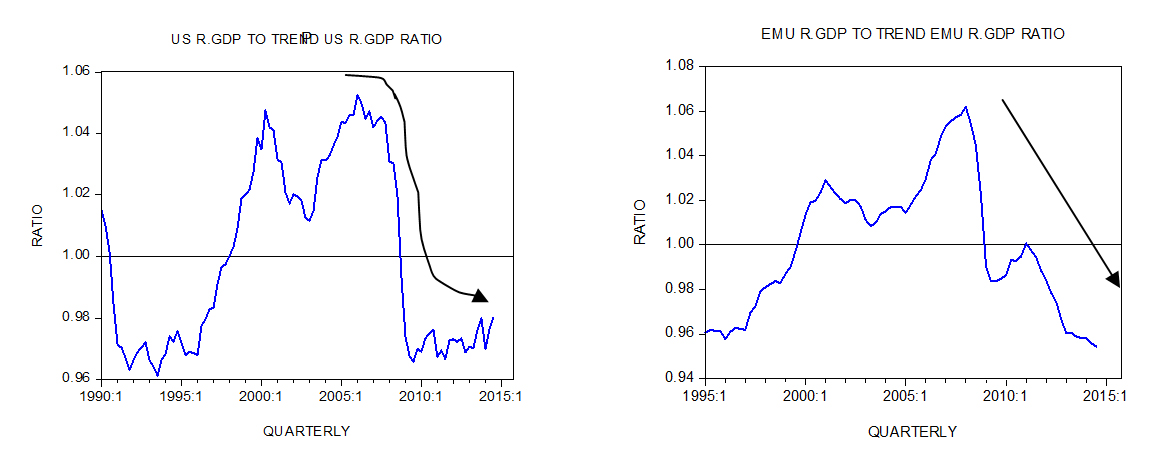Loose US monetary policy has had its echoes all around the world. The US dollar, once thought to be “as good as gold”, has now been shown be nothing of the kind. Gold bugs the world over have been proven right. Countries scattered all over the world have either dollarised, or run very tight pegs. In either case, this has meant largely adopting US monetary policy in countries as far flung as humble Ecuador (dollarised in 2002 following its own runaway inflationary disaster, which resulted in the emigration of 10% of the population) to the collection of Asian nations, China, Hong Kong, Malaysia, Taiwan, Indonesia, all of whom adopt some sort of peg to the US dollar. Without exception, each of these countries has experienced extreme property appreciation these last two years.
This documentary explores the Chinese experience.
The mechanism through which expansionary policies are communicated through China appear to follow the following pattern:
- Central government requires GDP growth/employment creation and so instructs the state-owned banks to lend.
- State-owned banks lend principally to state-owned companies as these are good credit-risks, backed – as they are – by the state.
- State-owned companies buy land from local governments for property development in accordance with a master plan for development of a new business district.
- Local governments spend the proceeds on who-knows-what…here the trail goes cold. However, land sales actually account for the vast majority of local governments’ income so one can be sure that they put plenty of pressure back on the central government to keep the cash coming! Once the local government has it, this cash leaks out into the real economy somehow. Some of it presumably gets recycled into new deposits on property.
- Individuals buy units using mortgages from private and state-owned banks, often using equity released from the appreciation of property bought in previous transactions. Ultra-low interest rates, fixed by the central bank, help them keep up with their repayments.
In short, this process is little different in essence from the credit-fuel property booms that have occurred the world over and it will have at its heart cronyism, corruption and waste.
The stories of the booms and busts of each country carry a different twist as the setup of institutions in each country is different, with the common flavour being that of credit growth aided by monetary expansion.
To the requisite ingredients of loose money and credit growth, China has added the explosive ingredient of it being a command economy, which has served to amplify the misallocation of capital. The results are spectacular. The most populous nation on earth does most things on an epic scale, and property boom and bust is seemingly no exception. Enjoy.
Related articles




In a productive and efficient economy land will naturally rise in value as it’s utility increases, there’s little wrong with this. However this rise in price then becomes and object of speculation and facilitates “monetary expansion”, just so I’m being crystal clear, the land market drives the credit market, not vice versa. Here’s how it works; land rises in price; banks lend against it’s value, this raises it’s price, banks feel safe and extend more credit against housing, housing rises in price…. and so on.
The end result is vastly inflated cost base, very dodgey balance sheets and eventual recession/depression as the unrealistic claims on future wealth production work their way through the system.
Mark my words, China will definitely suffer from the capitilist disease unless she gets a grip on her property (land) market.
That’s just Minsky’s theory of bubbles with “land” substituted for “capital”.
All complementary capital will behave as you claim land does. If this causes the economic cycle then the economic cycle can never be eliminated.
Real capital (buildings and machinery etc) will always behave differently to land because they’re able to be created upon demand. If tractors go up in price people don’t speculate in tractors, they build more of them (or speculate in the shares of tractor producers, which has the net effect of drawing more capital into the industry and aiding production)
Land works differently. When it goes up in price people hold onto it in the hope of benefitting of future price rises, this causes futher restrictions, speculative activity and inflationary price rises. There’s no way to offset this damaging chain by ramping up the production of land, because it’s not produced.
Any economist that conflates land with capital doesn’t know what they’re talking about, can you tell a car from a field? If you can then you know the difference.
The difference is gradual, not hard-and-fast.
Let’s suppose we have a freely reproducible good such as tractors. Then lets suppose they go up in price because of an increase in demand. Does that simply mean that tractor production increases and the price remains the same? No, that would be like saying that the supply schedule is horizontal. What happens is that output of tractors increases and the price of them rises. The degree to which one or the other occurs describes the gradient of the supply curve.
You may say that in the longer run the increase volume of production will allow more efficient processes and prices will fall. That is quite possible. But, it doesn’t necessarily happen. The production of tractors must compete for it’s inputs with other goods. Those inputs may rise in price so much that producing new tractors isn’t profitable. In that case old tractors will rise in value.
Think about it this way. If a billionaire wanted to he could create a new acre of land by reclaiming it from the sea. In the vast majority of place in the world (though perhaps not all) this wouldn’t be economically viable. That’s because the inputs involved would cost more than the output would sell for.
One important area where this sort of thing often happens is businesses. A working business contains a great deal of physical capital as well as knowledge and experience built up by it’s employees and management. It’s not impossible to build new businesses though. However, in many areas businesses have found it cheaper to buy existing businesses than to start new ones.
This is all very well, but the reaction of tractor prices to increased demand still doesn’t make them land, the price of a tractor (or any other true capital good) will be determined by the costs of production and over a given area -such as the UK- will be uniform. You won’t see tractors selling for 20x more in central London than in Hull, yet we accept this with “housing” without battering an eyelid.
It was obvious to anyone with an understanding of economics that housing prices would eventually explode in China, clearly the Austrians will try and shoehorn in a monetary explanation but the truth is much simpler; see my first post for details.
No it won’t be, and I’ve explained above why it won’t be. The “cost of production” doesn’t provide a true “theory of value” as 19th century debates established. Any robust theory of value is based on marginalism, substitution, and capital or complementary and competing forms. The Classical Economists lost their arguments with Jevons, Menger and Walras because they were wrong.
Broadly speaking the two competing forces that establish prices are the demand side and the supply side. In the long run neither force die away. Classical economists claimed that the supply side dominates in the long run and prices fall to the cost-of-production. If this happened then profit would be impossible in the long term (one of Marx’s points). In reality both are in a constant state of flux.
That’s because a house in London and a house in Hull are not the same product. Geographical location matters when travel and transport matter. Notice here that you are talking about houses, not land per se, houses are produced.
Similarly, in the market for transportable capital “topological” proximity matters. Take computers and mobile phones for example. Each have their own interfaces for software, so software will be compatible in some cases and not in others. If a computing platform has a lot of software written for it then it will be in demand, this is the equivalent of a house in London. If little software is written for a computing platform then demand will be smaller even if that platform is more provides better price/performance, this is the equivalent of a house in Hull.
And incidentally, the property market in China is already in a mess. I don’t see this as evidence for Georgism.
Marx’s Theory of Value was made redundant when Henry George came along, his competing analysis makes much more sense. It’s probably worth going over it here overwise we’ll be going around in circles. A theory of value explains that the worth of an object is equal to the amount of effort that was expended in creating it, well this is patently false. If I bought a load of food from the supermarket, mushed it all up and then encased it in concrete I’d have reduced the value of both the food and the un-mixed concrete, despite all the effort that I’ve put in. However if I made a fruit salad or a road with those materials I’d have increased their value, and this increase can be measured by noting how much more somebody is prepared to pay to acquire them
During each step a producer will add some value and these increments will materialise into the final selling price of the good, competition will reduce these costs but if a producer cannot cover them eventually he’ll go bust. And no, this doesn’t mean that in the long run profit will become impossible because profit is just another a cost of production that needs to be met, again this is economics 101, nothing fancy. A capitalist won’t bother directing the factors or production (land, labour and capital) if at the end of it there’s nothing left for him, he’d be better off as an employee, or on the dole. His return is profit, and it must be met is business is to produce.
You could plonk the exact same house in London and Hull and their respective prices would differ wildly, this isn’t because nails and bricks are 20x more expensive in London it’s because of the locational value. In terms of pricing geographical location always matters, although travel and transport do of course play a part of this. Notice that this would still be the case even if we adopted the gold standard or free market banking, the money supply aggravates a bad situation but it was all in place prior to the 1970’s fiat revolution.
Just as I can’t force a Christian to accept that there is no God, I can’t force an Austrian to accept Ricardo’s Law. The evidence is circumstantial, but it just so happens that one of the few countries to have a semi-georgist set up (Hong Kong) currently suffers from some of the lowest tax rates in the world and a gov’t surplus of 2 years expenditure. But of course, this is just a coincidence..